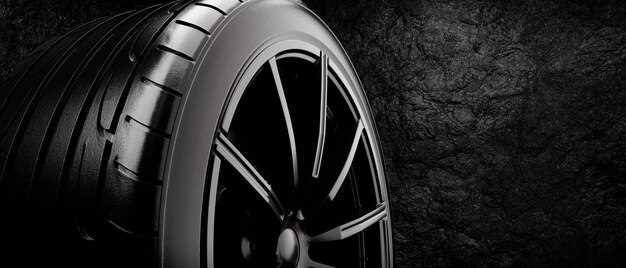Best Audi Tires for Performance Driving

When it comes to enhancing the driving experience of your Audi, choosing the right tires is crucial. Performance tires are designed to provide superior grip and handling, allowing Audi enthusiasts to fully leverage the power and precision that these vehicles offer. Whether navigating tight turns or accelerating on straightaways, the right set of tires can make all the difference in how your car performs.
Audi vehicles are renowned for their engineering excellence and dynamic capabilities. To match this pedigree, it is essential to equip them with performance tires specifically tailored for their design and driving characteristics. These tires are constructed with advanced materials and tread patterns that not only enhance grip but also improve stability and responsiveness on various road surfaces.
This article will explore some of the top performance tires available for Audi drivers. By examining key features and advantages, you will gain insights into which options will best suit your driving style and needs. Elevate your Audi’s potential with tires that promise exceptional grip and uncompromised performance.
Choosing the Right Performance Tire Size for Your Audi

When it comes to enhancing your Audi’s handling and overall driving experience, selecting the right performance tire size is crucial. The correct size not only ensures optimal performance but also affects safety and comfort. Understanding the tire size specifications is essential for making an informed decision.
Performance tires come in various dimensions, typically represented by a series of numbers and letters, such as 245/35R19. The first number indicates the tire’s width in millimeters, while the second number represents the aspect ratio, which is the height of the sidewall expressed as a percentage of the width. The letter denotes the tire’s construction type, and the final number indicates the diameter of the wheel, measured in inches.
1. Consult the Manufacturer’s Recommendations: Audi vehicles are designed with specific tire sizes that complement their performance capabilities. Always refer to the owner’s manual or the tire placard located on the driver’s side door jamb to find the recommended tire size for your model.
2. Understand the Performance Characteristics: Different performance tires are engineered for various driving conditions. For instance, summer performance tires offer superior grip in dry conditions, while all-season tires provide versatility. Choosing a size that aligns with your driving habits and regional climate will significantly impact your Audi’s performance.
3. Tire Width and Handling: Wider tires often lead to better traction, especially during cornering. However, they can also affect ride comfort and increase road noise. It’s important to balance width with other factors, such as aspect ratio, to maintain the desired handling characteristics of your Audi.
4. Aspect Ratio Considerations: A lower aspect ratio typically enhances performance by reducing sidewall flex during aggressive driving. Conversely, a higher aspect ratio can improve ride comfort but may compromise handling precision. Evaluate how you prioritize these factors based on your driving style.
5. Professional Guidance: If you’re unsure about the best performance tire size for your Audi, consult with a tire specialist or a trusted mechanic. They can provide insights based on your vehicle’s specifications and performance requirements.
In summary, choosing the right performance tire size for your Audi involves understanding the specifications, considering your driving needs, and evaluating the materials available. Invest time in this decision, as the right tires can significantly enhance your vehicle’s performance and driving enjoyment.
Understanding the Importance of Tire Grip for Handling
Tire grip plays a crucial role in the performance of any vehicle, particularly for Audi drivers who seek an exhilarating driving experience. High-performance tires are specifically designed to maximize grip, ensuring optimal handling capabilities in various conditions. The relationship between grip and handling can significantly impact vehicle stability, responsiveness, and ultimately, the driver’s confidence on the road.
The tread pattern of performance tires is engineered to enhance contact with the road surface. This design helps channel water away in wet conditions, reducing the risk of hydroplaning and maintaining traction. The rubber compounds used in high-performance tires offer greater stickiness, which translates into improved grip and control during acceleration, cornering, and braking. This is particularly important for Audi drivers who often push the limits of their vehicles.
Handling is not just about how a vehicle responds to steering inputs; it encompasses the overall stability of the car during maneuvers. A tire with excellent grip allows drivers to take turns more aggressively while maintaining control. This is essential for sports-oriented Audis, where precision and agility are expected. In contrast, tires with poor grip can lead to understeer or oversteer, compromising safety and performance.
Furthermore, tire grip is influenced by factors such as temperature and road conditions. Performance tires are optimized for specific temperatures, providing superior handling when warmed up. Therefore, understanding the characteristics of tire grip and selecting the right performance tires can enhance the driving dynamics of any Audi, offering an unparalleled combination of speed, control, and enjoyment.
Comparing Summer vs. All-Season Performance Tires for Your Audi
When it comes to optimizing the performance of your Audi, selecting the right tires is crucial. Two popular options are summer tires and all-season tires, each offering distinct benefits and drawbacks. Understanding these differences can help you make an informed choice.
Summer Performance Tires
Designed for warm weather conditions, summer tires excel in providing superior grip and handling. Their specific tread patterns and rubber compounds maximize contact with the road, delivering enhanced performance. Here are some key advantages:
- Excellent Grip: Summer tires provide optimal traction on both dry and wet roads, making them ideal for spirited driving.
- Better Handling: The tread design allows for precise steering response and stability during cornering.
- Increased Braking Performance: Shorter stopping distances are achieved due to enhanced rubber compounds and tread patterns.
However, these tires are not suited for winter conditions. Their performance diminishes significantly in temperatures below 40°F (4°C), and they can wear out faster if used in colder climates.
All-Season Performance Tires
All-season tires offer versatility, designed to perform reasonably well in various weather conditions. They are a popular choice for drivers who encounter fluctuating weather but may compromise on extreme performance. Key characteristics include:
- Versatile Grip: All-season tires provide acceptable traction in both wet and dry conditions, although they may lack the level of grip found in dedicated summer tires.
- Comfortable Ride: They tend to generate less road noise and offer a more comfortable driving experience.
- Winter Capability: These tires can handle light snow and cold temperatures, making them suitable for year-round driving in moderate climates.
Despite these benefits, all-season tires often provide less sharp handling and braking performance compared to summer tires when pushed to their limits.
Conclusion
Ultimately, the choice between summer and all-season performance tires for your Audi depends on your driving habits and conditions. If you prioritize maximum grip and handling, especially in warmer months, summer tires are the ideal choice. Conversely, if you require a more versatile option for varied weather conditions, all-season tires may be more appropriate. Assess your needs carefully to ensure you select the right tires for optimal performance.
Top Brands of Performance Tires Recommended for Audi Models
When it comes to enhancing the performance of your Audi, choosing the right tires is crucial. Here are some top brands recognized for their exceptional grip and superior quality:
Michelin is renowned for producing high-performance tires that combine exceptional grip with durability. The Michelin Pilot Sport series is particularly popular among Audi enthusiasts, providing excellent handling and responsiveness in both wet and dry conditions.
Bridgestone offers the Potenza line, which is designed for sporty cars like Audi models. These tires are engineered for maximum high-speed performance, ensuring optimal grip during cornering and acceleration.
Continental is another leading brand, known for its high-quality performance tires. The Continental ExtremeContact series delivers outstanding traction and control, making it an ideal choice for Audi drivers who value precision on the road.
Pirelli has built a reputation in motorsports and is favored by many Audi models for their P-Zero line. These tires offer exceptional grip and stability, especially in high-performance driving scenarios.
Dunlop provides tires designed with performance in mind, such as the Sport Maxx series. These tires excel at offering strong grip and responsiveness, suitable for both everyday driving and track use.
Choosing tires from these top brands will enhance your Audi’s performance capabilities, ensuring a driving experience that combines safety, speed, and control.
Performance Tire Maintenance Tips for Optimal Grip
Maintaining your performance tires is crucial for ensuring maximum grip and enhancing overall driving experience. Regular inspection and proper care can significantly extend the lifespan of your tires while optimizing performance on the road.
First, regularly check the tire pressure. Under-inflated tires can reduce grip and increase wear, while over-inflated tires can lead to reduced contact with the road. Always follow the manufacturer’s recommended pressure specifications.
Next, inspect the tread depth frequently. Adequate tread depth is essential for maintaining optimal grip, especially in wet conditions. Use a tread depth gauge to measure and replace tires when the tread reaches 2/32 of an inch or less.
Rotation of your tires should be done every 5,000 to 7,500 miles. This practice helps to ensure even wear across all tires, which enhances traction and grip during cornering and acceleration.
A regular alignment check is also important. Proper wheel alignment helps to maintain even tire wear and improves handling precision. Misalignment can cause uneven wear patterns, reducing grip and increasing the risk of skidding.
Additionally, monitor for any signs of damage, such as cracks, bulges, or foreign objects lodged in the tires. Address any issues immediately, as damaged tires can severely affect grip and overall safety.
Finally, consider seasonal tire changes if you live in an area with extreme weather conditions. Performance tires designed for specific conditions (summer or winter) can offer better grip and handling, enhancing your driving enjoyment and safety.
Cost vs. Benefit: Investing in Premium Performance Tires

When it comes to enhancing your Audi’s performance, the choice of tires plays a critical role. While premium performance tires often come with a higher price tag, the benefits they offer justify the investment. One of the most significant advantages is the superior grip they provide, which translates into better handling and stability at high speeds. This increased grip allows for enhanced cornering capabilities, making your driving experience more exhilarating and safer.
Premium performance tires are designed with advanced rubber compounds and tread patterns that optimize traction on both wet and dry surfaces. This means that while you may spend more upfront, the long-term benefits include improved safety and potentially lower maintenance costs due to reduced tire wear. Furthermore, the enhanced performance can lead to a more enjoyable driving experience, allowing you to fully appreciate the engineering excellence of your Audi.
In addition, investing in quality performance tires can lead to better fuel efficiency. High-quality tires reduce rolling resistance, which can positively impact your overall mileage. Although the initial cost may deter some drivers, the combination of improved grip, safer handling, and enhanced efficiency makes premium performance tires a smart choice for Audi enthusiasts looking to get the most out of their vehicles.
Ultimately, the cost of premium performance tires should be viewed as an investment in your vehicle’s capability and your driving pleasure. The benefits far outweigh the expense, making them a worthy consideration for those who demand excellence from their Audi.




